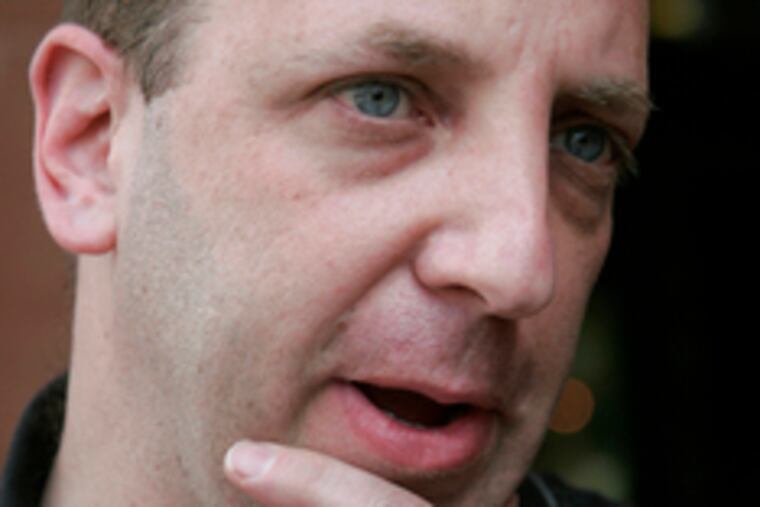As clock ticks, still much to be decided
Poll indicates a surge for Nutter, but 1 in 5 voters still on fence.

Many Philadelphia Democrats are behaving like shoppers thumping melons in the produce aisle, according to a new poll of the mayoral race.
Slightly more than one-fifth in a Keystone Poll released yesterday were undecided as the primary campaign headed into the final week, and 41 percent of those who preferred a candidate said they could change their mind.
"This is a big election about big issues with a pretty solid cast of characters. None is the perfect prototype of a mayor, but they each have a piece of what it takes," said Terry Madonna, director of the poll and a professor at Franklin and Marshall College. "That explains why voters have had such a difficult time."
Nonetheless, the poll found movement toward former Councilman Michael Nutter, who led businessman Tom Knox, 31 percent to 21 percent. (The poll has a margin of error of plus or minus 5 percentage points.)
Knox has been running as an outsider who would end political corruption. Nutter has stressed his record of ethics legislation, along with a pledge to declare states of emergency in high-crime areas and allow officers to stop and frisk people suspected of carrying concealed weapons.
In every poll so far, violent crime has been the top concern on voters' minds.
About 68 percent of the undecideds in the Keystone Poll were women, more than double the level of undecided men.
Cyndy McCarthy said her Kensington neighborhood is plastered with posters for Bob Brady, but she remains undecided - though impressed that the campaign has been relatively free of mud-slinging.
"They just promote themselves," said McCarthy, 26, who works for a health insurer. She said she would visit each candidate's Web site Monday night - the eve of the primary - to make up her mind.
Undecided Democrats in the poll were more likely to be African American (56 percent) and middle aged (38 percent), with less than a high school education (57 percent) and annual pay below $35,000 (52 percent).
David S. Leider, a corporate controller, went to hear Knox speak yesterday to help make up his mind between the former insurance executive and Nutter.
"It confirmed my indecision," Leider said, adding that he likes Knox's no-nonsense approach to fiscal matters. But "when I listen to Mike Nutter, especially his advert with his daughter, it strikes me he is a strong family-oriented person, a very responsible person."
So what's a conflicted guy to do? Leider said he would look at the latest polls Monday. "If I feel on the 14th that my vote would be wasted on Tom Knox, then - of all the other candidates I'd prefer to see Mike Nutter assume the office."
The poll of 385 registered Democrats was conducted May 2 through Monday.
Campaigns of candidates trailing in the poll - U.S. Reps. Brady and Chaka Fattah and State Rep. Dwight Evans - seized on the high undecided number as a sign of hope.
But about half of registered voters who tell pollsters they are undecided this late in a campaign typically do not show up to vote, Madonna and other pollsters said. Those who do either break toward the candidate with momentum or split evenly among all contenders in a multi-candidate field.
In a Susquehanna Polling and Research survey on April 26, the 27 percent of voters who said they were undecided were also predominantly African American and female. Forty-eight percent of undecided voters were elderly, and 60 percent lived in Fattah's U.S. House district.
"You'd think some of that would go back to Fattah, who's had his support with African Americans bouncing around," said James Lee, president of the firm. "There's something to be said for street organization. Fattah and Brady are the two candidates in the race with strong organizations, and they have the potential to finish higher than what the polls are showing right now."
But time is running out.
Mary Gilbert, a retired Strawbridge's clerk, was angry the other day as she shopped at Produce Junction in Wynnewood.
"None of them did anything," she snorted, speaking of the field of five. Pushed to make a choice, Gilbert said she leaned toward Knox: "He's new. At least let's give him a chance."
Retiree Henry Klein went to hear Knox speak yesterday. He said he was considering voting for him, but had some hesitation.
"Nutter far outweighs him in experience," said Klein, 88.
Until a few days ago, Anthony Riley was confident he would vote for Fattah on Tuesday. Now the street musician is unsure.
After a City Hall news conference yesterday, a young man asked Fattah how he would stop teenagers from killing each other.
"I heard him say that when he becomes mayor, youth will become the No. 1 priority in the city. I don't know what that means," Riley, 20, said afterward. Where he lives, at 60th and Race Streets, "I hear gunshots. . . . I see people get shot. I'm trying to find a leader. I don't see it in Fattah."
Asked for whom he might vote, Riley said: "I honestly don't know."
Nutter also led among white voters in the Keystone Poll, with 37 percent support - an anomaly in a city that often votes on racial lines.
Kathleen McDonald of South Philadelphia went up to Nutter as he walked through the Reading Terminal Market yesterday to tell him that he had her vote.
She said she saw a strong leader in the Monday night NBC10 debate moderated by Chris Matthews.
Nutter "let me know that if he became mayor, I'd be safer in the city of Philadelphia," said McDonald, who is white. "I like the idea of 'stop and frisk.' There's nothing wrong with that if people look like they're not doing the right thing, no matter what color they are."